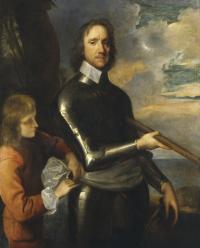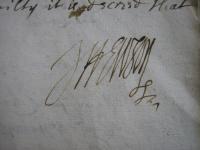Cromwellian courts martial records
Published in Confederate War and Cromwell, Cromwell, Early Modern History (1500–1700), Features, Issue 1(Jan/Feb 2012), Volume 20
Oliver Cromwell—documentary evidence for this most controversial of historical periods in Ireland is almost non-existent. Consequently, apocryphal stories, good yarns and folklore have often taken the place of hard facts in the popular imagination. (National Portrait Gallery, London)
Our understanding of the Cromwellian period from 1649 to 1660 has been sorely hampered by the fact that the records of the period were lost in the destruction of the Four Courts in 1922. The fact that the documentary evidence for this most controversial of historical periods is almost non-existent has meant that apocryphal stories, good yarns and folklore have often taken the place of hard facts in the popular imagination.The Dublin courts martial were presided over by Colonel John Hewson, governor of the city, who saw action under Cromwell at the infamous sack of Drogheda in 1649, and give a fascinating insight into military discipline and internal security among the Cromwellian forces. They demonstrate how the military upheld the authority of the officers over their men, and of the army over the civilian population. During the fourteen months covered by the records, the courts heard cases against 314 individuals—81 civilians and the remainder Cromwellian troops. The most common cases brought against the defendants were for theft (54), spying for or communicating with the enemy (43), desertion (31), drunkenness (30) and neglect of duty (24).The death penalty was handed down in 45 cases, reflecting the harshness of the wider legal system, which saw men, women and children hanged for offences that seem trifling to modern eyes. The majority of the punishments handed out by the courts martial were corporal in nature, often involving a dimension of public shaming or humiliation. The courts martial, harsh though they may seem to us, offered some element of due process in time of war, compared to the arbitrary punishments often imposed by individual commanders on the ground.
![Sentence passed on Patrick Murphy on Tuesday 17 February 1652:Ensign Latham informantPatrick Murphy Def[en]d[en]t The defend[en]t Confessing himselfe upon the charges to have bin drunk on Sathurday last and that he broke his muskett. It was ordered that [deleted: in regard he hath bin in prison since Sathurday and had nothing to sustaine him but water] he shall pay for the providing of a muskett [and] he shall be whipt at ye parade and receive twelve stripes and afterwards be Cashiered [from] the Army. (Marsh’s Library)](/wp-content/uploads/2013/03/Cromwellian-courts-martial-records-2.jpg)
Sentence passed on Patrick Murphy on Tuesday 17 February 1652:Ensign Latham informant
Patrick Murphy Def[en]d[en]t
The defend[en]t Confessing himselfe upon the charges to have bin drunk on Sathurday last and that he broke his muskett. It was ordered that [deleted: in regard he hath bin in prison since Sathurday and had nothing to sustaine him but water] he shall pay for the providing of a muskett [and] he shall be whipt at ye parade and receive twelve stripes and afterwards be Cashiered [from] the Army. (Marsh’s Library)

One of the most noteworthy aspects of the surviving records is the great flourish with which the commanding officer, John Hewson, signed many of these death warrants. Seeing his signature flow across the page, there is a palpable sense that he enjoyed the power and drama of his life-and-death decisions. (Marsh’s Library)
Public morals were an important consideration in Cromwell’s Puritan army, and Richard Braye was cashiered for playing cards and drinking ‘at an unseasonable’ time of night. John Beaden was given 30 lashes on Wood Quay and dismissed from the army for being drunk, while Patrick Murphy—a surprisingly Catholic-sounding name for a Cromwellian soldier—was given twelve lashes and ejected from the ranks for breaking his musket while under the influence (see above). Patrick Brawban had his tongue bored through with a hot iron for swearing, drunkenness and neglect of duty. The punishment of at least fifteen soldiers was to ‘run the gauntlet’, which involved passing between two lines of soldiers who were armed with cudgels. The injuries received could be very severe, particularly when, as in the case of the deserter John Bayly, the offender had his hands tied behind his back so that he could not protect his face and head from his comrades’ blows.These recently discovered records provide us with striking (!) echoes of the bustling, frenetic, dangerous, sometimes far from orderly lives of Cromwellian soldiers during the 1650s. They shed interesting light on the garrison and its relationship with sections of the wider civilian population. The fact that they were only recently unearthed in Marsh’s Library, right in the heart of central Dublin, suggests that there may well be other important manuscripts from the period in Marsh’s Library and other Irish repositories that await discovery by scholars brave enough to go beyond Boolean searches in on-line library catalogues. The discovery of these court martial papers demonstrates that a good historian often needs nothing more than an innate sense of curiosity and a degree of serendipity. HI
Jason McElligott is Keeper of Marsh’s Library.
Further reading:
I. Gentles, H. Maclean & M. O Siochrú, ‘Minutes of courts martial held in Dublin, 1651–53’, Archivium Hibernicum (2011).
















